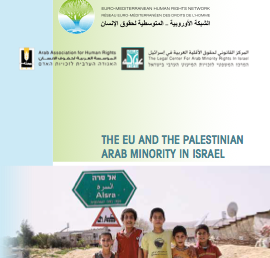Adalah: Israel Participates in UN UPR at Eleventh Hour, Compromises Review

Today, Tuesday 29 October 2013 in the afternoon, Israel is expected to appear for its second Universal Periodic Review (UPR) in Geneva. Israel was the first state to refuse to participate in its previously scheduled UPR on 29 January 2013, and in fact Israel has been boycotting certain UN human rights mechanisms for 1.5 years. It remained unclear whether Israel would participate until two days ago, and the government only released its mandatory national report yesterday, 28 October 2013, the day before the review.
“The UPR system demands active engagement and rigorous review from both UN member states and civil society, and the uncertainty surrounding Israel’s participation has had a serious and negative impact on the ability of human rights organizations on the ground to contribute to the process,” said Adalah’s Director of International Advocacy, Rina Rosenberg.
In September 2013, Adalah submitted an updated report regarding Israel’s compliance with international human rights law to the UPR as related to the rights of Palestinian citizens of Israel. However, Israel’s newly released national report contains critical omissions and misinformation regarding the key human rights concerns of this community.
- Regarding the representation of Arab women in the civil service (para. 28): Israel notes that from 2008 to 2011, “there has been an increased of 30.6% in the rate of Arab and Druze women employed in the civil service.” The state omits that Arab women, who make up 10% of the population of Israel remain severely under-represented; and as of 2011, made up only 1.8% of civil servants.
- Regarding Economic, Social and Cultural Programs for the Arab community (para. 30): Israel fails to mention that in August 2013, the Israeli Cabinet approved a list of new ‘National Priority Areas’ (NPAs) consisting of 20 new towns, all Jewish, including nine illegal settlements in the Occupied West Bank. NPAs are municipal regions designated by the government to receive significant tax cuts, special benefits and funds for housing, education and culture, as well as tax exemptions, special mortgage rates, and other lucrative subsidies.
- Regarding combatting racism, discrimination and anti-Semitism (iii, paras. 33-38): Israel’s national report makes no mention of the wave of discriminatory legislation that directly targets the rights of Palestinian citizens of Israel. Israel’s lack of a constitutionally guaranteed right to equality allowed the previous 18th Knesset to enact 20 discriminatory laws; similarly, in the first parliamentary session of the current 19th Knesset (from March-July 2013), 35 new bills were proposed that discriminate against Palestinians in Israel and in the Occupied Palestinian Territory.
- Regarding Developments in the Protection of Children’s Rights (vii, paras. 53-57): The state failed to note that the proposed national budget for 2013-2014 substantially reduces monthly child allowances. The new policy will significantly affect Arab families as they make up nearly 45% of Israel’s poor population, and widen socio-economic disparities between Jewish and Arab citizens. Furthermore, the Supreme Court upheld a 2010 law that reduces child allowances by up to 60% for families with children whom have not received all of the vaccinations mandated by the Ministry of Health. Vaccinations are given at mother and child clinics, of which there is a severe shortage in the Naqab (Negev) due to the state’s neglect.
- Regarding the Right to Family Life (xi. Paras. 78–83): Israel claims that it is committed to promoting the right to family life, despite the ban on Palestinian family unification. Israel fails to acknowledge that in April 2013, the Knesset extended Israel’s ban on the family unification of Palestinian families inside Israel until 30 April 2014. The Citizenship and Entry into Israel Law, as amended in 2003, prevents spouses of Palestinian citizens of Israel, who are from the West Bank, Gaza Strip, and countries deemed ‘enemy states’ by Israel from living together in Israel.
- Regarding Ensuring the Rights of the Bedouin Population (iv. Paras. 106–113): The Prawer Plan and the implementing legislation, the Prawer-Begin bill, are among the primary human rights concerns of Palestinian citizens of Israel. Israel’s national report perpetuates myths and misconceptions about both the Bedouin community in the Naqab (Negev) and the Prawer Plan to displace the indigenous community from their ancestral land. If fully implemented, the plan will destroy dozens of ‘unrecognized’ Bedouin villages in the Naqab, forcibly displace up to 70,000 Bedouin citizens of Israel (the population of the ‘unrecognized’ villages), confiscate over 800,000 dunams of ancestral Bedouin land in the Naqab/Negev, and impose a resolution of outstanding land claims in the state’s favor. With regard to the consultation process, Adalah reiterates that the post-facto consultation, after the government already approved the plan, does not constitute meaningful participation in decision-making as required by international law. Significantly, none of the grievances of the community were incorporated into the revised version of the plan or bill.
For more information, see:
See also Adalah's Submission to the Human Rights Council, and Suggested Questions for the UPR, November 2012.
See NGO STATEMENT: Israel's Obstruction of UN Human Rights Mechanisms Has Far-reaching Consequences, 29 January 2013
Contact: Adalah’s Media Director: Salah Mohsen: salah@adalah.org, 052-595-0922













